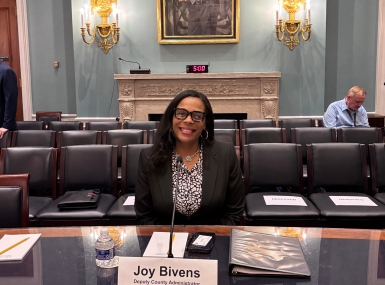Senators introduce Child Care Modernization Act to strengthen child care systems
Author

Julia Cortina

Kevin Moore
Upcoming Events
Related News

Key Takeaways
On September 17, Sens. Deb Fischer (R-Neb.) and Kirsten Gillibrand (D-N.Y.) introduced the bipartisan Child Care Modernization Act (S. 2828), legislation aimed at strengthening child care systems and improving access for families.
What's in the bill?
If enacted, the legislation would reauthorize the Child Care and Development Block Grant (CCDBG), the primary federal funding source for subsidies to help low-income families access child care. Last reauthorized in 2014, CCDBG is the discretionary portion of the Child Care and Development Fund (CCDF) and must be funded by Congress every fiscal year. According to the most recent state plans, counties are responsible for administering CCDF in Colorado, Minnesota, North Carolina, North Dakota, New York, Ohio, Virginia and Wisconsin.
The bill would also transition state reimbursement rates for providers from the current market-rate survey model to a cost-estimation model that would more accurately reflect the expenses of delivering high-quality child care by including costs necessary to recruit, train and retain qualified staff. Additionally, the bill would create new child care supply and facilities grants to expand availability, require consultation with child care providers, parents and counties when developing state plans and provide new technical assistance to in-home and rural child care providers.
What impact does the bill have on counties?
Counties play a key role in administering CCDF, connecting families to resources and investing in local child care supply. The Child Care Modernization Act would strengthen provider networks, reduce administrative burdens and improve equity in child-care access.
“Counties are essential partners in the nation’s child care system and responsible for administering the Child Care Development Block Grant in eight states. The Child Care Modernization Act will help improve families’ access to affordable, high-quality child care by making much needed updates to CCDBG and expanding the supply and capacity of providers,” said NACo Executive Director Matt Chase. “Counties thank Senators Fischer and Gillibrand for their bipartisan leadership and urge swift passage of this legislation.”
Resource
Support the Child Care and Development Fund (CCDF)

Related News

NACo testifies on the county role in administering SNAP
On September 9, Franklin County, Ohio Deputy County Administrator Joy Bivens testified on behalf of NACo before the U.S. House Agriculture Subcommittee on Nutrition and Foreign Agriculture at a hearing titled “Exploring State Options in SNAP.”

Law enforcement, mental health pros collaborate in Virginia county
Henrico County, Va.’s crisis response continuum brings together law enforcement and behavioral health professionals to de-escalate mental health crises and avoid unnecessary incarcerations and hospitalizations.

Farm Bill expiration: What counties need to know
On September 30, 2025, the 2018 U.S. Farm Bill, officially known as the Agriculture Improvement Act of 2018 (P.L. 115-334), expired.